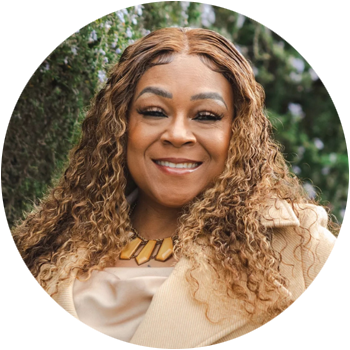Healing the Healers: Introducing the BYRD Model for Culturally Rooted Trauma Care
Presented by: Sharlisa L. Byrd, LMFT
June 5, 2026 | 9:00 AM - 12:00 PM Pacific
3 Hours | 3 CEs
 Sharlisa L. Byrd, LMFT, presents a live virtual professional training program on Healing the Healers: Introducing the BYRD Model for Culturally Rooted Trauma Care.
Sharlisa L. Byrd, LMFT, presents a live virtual professional training program on Healing the Healers: Introducing the BYRD Model for Culturally Rooted Trauma Care.
Healing the Healers: Introducing the BYRD Model for Culturally Rooted Trauma Care is a 3-hour training is designed for clinicians, educators, and graduate-level students seeking to deepen their understanding of trauma-informed, culturally responsive care. Developed by Sharlisa Byrd, LMFT, this training introduces participants to the BYRD Model—a somatic and justice-driven framework for healing that centers the embodied experience of trauma, particularly among marginalized communities.
Grounded in real-life narratives and supported by somatic psychology, the BYRD Model invites clinicians to integrate four key pillars—Belonging, Yielding, Resilience, and Disruption—into their therapeutic practice. These concepts are explored through storytelling, case studies, and experiential somatic exercises that promote nervous system regulation, cultural attunement, and collective care.
Participants will walk away with a fresh perspective on how to apply body-based healing tools in clinical work, how to identify and challenge systems of harm, and how to sustain their own resilience as helping professionals. Whether you're a new clinician or seasoned practitioner, this course provides immediately applicable tools for fostering deeper healing for both clients and clinicians navigating oppressive systems.
This program is more than a training—it’s a call to reclaim wellness as a radical act of resistance, and to support healing not only for our clients, but for ourselves.
Upon completion of this training, participants will be able to:
Key topics covered in this training include:
Welcome & Grounding Practice (15 min)
Why the BYRD Model Was Created (30 min)
Deep Dive into Belonging & Yielding (45 min)
Deep Dive into Resilience & Disruption (45 min)
Somatic Integration & Application (30 min)
Reflection & Closure (15 min)
Palo Alto University, Continuing & Professional Studies (CONCEPT) is approved by, recognized by, or maintains sponsorship/ provider status with the following boards and agencies. We maintain responsibility for all content in our CE/CPD programs. For more information, visit here.
American Psychological Association (APA): Approved sponsor of continuing education for psychologists.
Association of Social Work Boards (ASWB): Approved continuing education provider (ACE program, Provider #1480), 11/22/2023–11/22/2026.
Canadian Psychological Association (CPA): Approved to sponsor continuing education for psychologists.
National Board for Certified Counselors (NBCC): Approved Continuing Education Provider (ACEP No. 7190).
Palo Alto University, Continuing and Professional Studies (CONCEPT) is approved by the American Psychological Association to sponsor continuing education for psychologists. Palo Alto University, Continuing and Professional Studies (CONCEPT) maintains responsibility for this program and its content. Palo Alto University, Continuing and Professional Studies (CONCEPT) is approved by the Canadian Psychological Association to offer continuing education for psychologists. Palo Alto University, Continuing and Professional Studies (CONCEPT), SW CPE is recognized by the New York State Education Department’s State Board for Social Work as an approved provider of continuing education for licensed social workers #SW-0356 and the New York State Education Department’s State Board for Mental Health Practitioners as an approved provider of continuing education for licensed mental health counselors. #MHC-0073. Palo Alto University, Continuing and Professional Studies (CONCEPT) has been approved by NBCC as an Approved Continuing Education Provider, ACEP No. 6811. Programs that do not qualify for NBCC credit are clearly identified. CONCEPT Professional Training, #1480, is approved to offer social work continuing education by the Association of Social Work Boards (ASWB) Approved Continuing Education (ACE) program. Organizations, not individual courses, are approved as ACE providers. State and provincial regulatory boards have the final authority to determine whether an individual course may be accepted for continuing education credit. CONCEPT Professional Training maintains responsibility for this course. ACE provider approval period: 11/22/23-11/22/26. Social workers completing this course receive (clinical or social work ethics) continuing education credits.